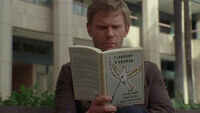Everything That Rises Must Converge is the book Jacob is seen reading in "The Incident, Part 2". It is a short story collection written by Flannery O'Connor.
Contents[]
The collection's stories are generally in the style of O'Connor's Southern Gothic, portraying grotesque characters, problematised familiar relationships, and examining the role of religion in the internal and interpersonal lives of her characters. The story after which the collection is named is about a man and his mother riding an integrated bus in the South, and their clashing views of the world around them.[1]
On The Show[]

In "The Incident, Part 2", Jacob can be seen reading this book while on a park bench directly before John Locke is seen falling out of a window. In this same episode we see Jacob talking to his rival of sorts about different aspects of how things around them and in general take place, which is a connection to the way the novel was written and what it is about. The book is also about flawed characters who sometimes go through some spiritual growth or change and often meet a shocking end, often of a violent nature, which is similar in many regards to the events that happen on Lost. Specifically it is similar to what is happening to the characters Jacob is visiting, particularly John Locke who at the moment has plummeted to what very easily would have been death for most people.
The title and cover of the book, even when taken without any context to the book's contents, has relevance to both the scene and the story of Lost as a whole and may provide some foreshadowing for season 6. "Everything That Rises Must Converge" can be taken to have a subliminal message about the events unfolding behind Jacob, which is John Locke falling out of a window. John Locke, in a way, has 'risen' literally on a high floor of a tall building and is now 'converging' with the ground. The photo of the book also features a bird being struck by an arrow, which indirectly hints at a violent and unfortunate event similar to what's happening to John Locke in the scene.
The book's title is a reference to a work by the French Jesuit priest, theologian, philosopher, and paleontologist Pierre Teilhard De Chardin titled the "Omega Point": "Remain true to yourself, but move ever upward toward greater consciousness and greater love! At the summit you will find yourselves united with all those who, from every direction, have made the same ascent. For everything that rises must converge."[2]
External links[]
- The book's article on Wikipedia: Everything That Rises Must Converge.
- The author's article on Wikipedia: Flannery O'Connor.
- Source of O'Connor's use of the title phrase: Pierre Teilhard de Chardin.
